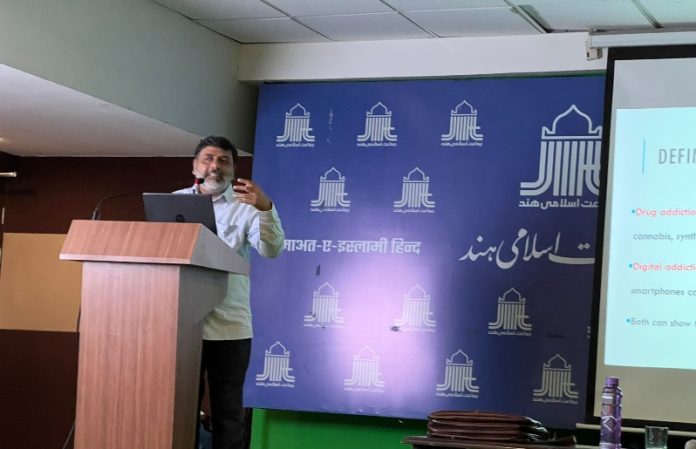New Delhi: Dr. Mohammad Rizwan, Director of the Centre for Study and Research, New Delhi, has described digital addiction as an “invisible pandemic” rivaling drug abuse in its social and neurological impact. Delivering a detailed lecture at the headquarters of Jamaat-e-Islami Hind, he said digital addiction is now as widespread and destructive as chemical dependency, but harder to detect because it hides beneath daily routines.
Drawing on neuroscience and Islamic psychology, Dr. Rizwan explained that both substance and digital addictions share the same mechanism in the brain. The release of dopamine, a pleasure-related chemical, reinforces compulsive behavior whether the stimulus is a drug or a social media notification. “Continuous use of something despite knowing its harm is the essence of addiction,” he said. “Each like, message, or follower triggers the same brain response as narcotics.”
He noted that India’s 2019 national study on substance abuse showed exposure to addictive behavior beginning as early as ten years old. Digital addiction, he said, is spreading even faster. About 14% of urban college students exhibit severe digital dependence, while up to 65% fall into the moderate-to-severe range. Students, professionals, and even medical trainees are caught in this loop, often without realizing it.
Dr. Rizwan outlined the three stages of addiction—entry, moderate, and severe—and warned that most people are already in the middle stage. The overuse of devices alters brain plasticity, reshaping thinking and emotional responses. Algorithms then reinforce existing beliefs, pushing users into narrow ideological spaces and reducing tolerance for differing opinions.
He listed mental, physical, and social consequences of digital addiction: anxiety, depression, sleeplessness, neck pain, and reduced productivity. Socially, families face conflict, and youth lose focus on studies and relationships. He said digital dependency erodes empathy and self-control, much like substance abuse.
Explaining the causes, he identified psychological escape from stress, physiological craving for pleasure, and social pressures that encourage overuse. He added that the post-COVID digital boom has deepened the problem, with many professionals now spending most waking hours online.
To counter this, Dr. Rizwan presented his “NPL Model,” which stands for Need-based, Prioritized, and Limited use of technology. He advised users to identify genuine digital needs, prioritize essential functions, and consciously limit time on non-productive platforms. He recommended regular “Digital Detox” days to disconnect and re-engage with real-world relationships.
From an Islamic perspective, he said, addiction thrives in isolation, while Islam builds connection through prayer, community, and purpose. Congregational worship and social responsibility protect believers from loneliness and escapism. “Faith gives meaning, structure, and restraint,” he said. “It transforms the mind from consumption to contribution.”
He concluded that Muslims must approach technology with awareness and discipline. “Technology should serve the soul, not enslave it,” he said, urging institutions to promote ethical digital habits rooted in Islamic teachings.




